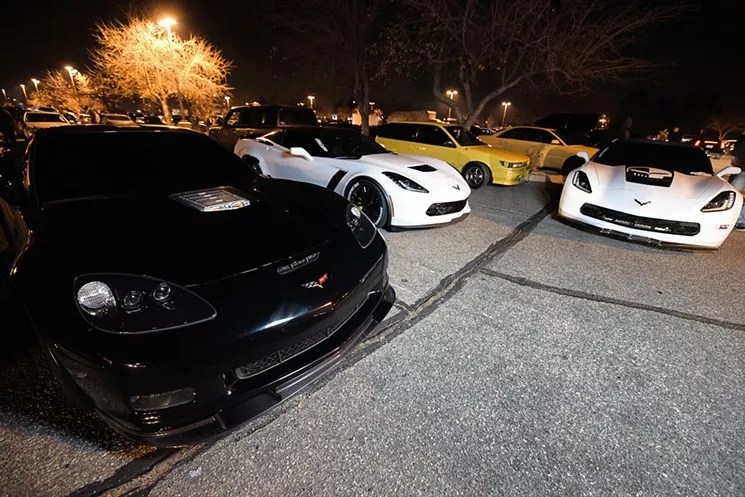
Anthony Camera

Audio By Carbonatix
One of Englewood City Councilor Rita Russell’s constituents contacted her in early April after a street racing event in the city had caused worries that there was a shooting because of how many cars backfired.
Russell says Englewood has experienced gatherings of over 100 cars multiple times this year in large parking lots on the city’s outskirts, where people meet for impromptu, unpermitted car shows before racing each other, causing disturbances and safety problems.
“I do know it’s problematic for neighborhoods, and if a car gets out of control and runs into a house, that’s dangerous also,” Russell says. “Do we have laws that we can enforce? What can we do to address this?”
Next month, Englewood City Council will consider an ordinance to broaden the penalties for drag racing by allowing the seizure of vehicles involved in the activity in certain cases.
Matthew Thuente, an investigator in the Englewood Police Department’s Professional Standards Bureau, says police observe many street races during the summer and other warm months. The department isn’t able to easily track the exact number, as instances are tagged as reckless driving and grouped along with other reckless-driving-related crimes, but police are working with other city officials to improve the response to large-scale drag racing events.
“To address street racing effectively, we leverage social media to identify and monitor potential meetups, engaging with organizers to encourage compliance,” Thuente says. “We also actively raise community awareness about these gatherings to promote vigilance and prevent illegal activities.”
When street racing events happen, the police will issue citations when needed, Thuente adds. Englewood law enforcement also collaborates with other police departments around the city’s borders, like Denver and Littleton, to coordinate responses to the problem.
“It’s not an Englewood problem,” Police Chief Sam Watson told city councilmembers in an April study session. “It’s not even a Denver metro problem. It’s happening all over the country.”
Although the problem isn’t unique to Englewood, the city wants to be sure it has tools to dissuade people from the dangerous practice.
“I’ve heard anecdotally about cities making a public spectacle of crushing vehicles that they have seized as a result of street racing, something I would support,” Councilmember Steven Ward said in the study session. “It actually very much sends the message that you don’t do this in my town and get away with it.”
Though car-crushing isn’t likely to be in the final ordinance, car seizure is. According to Englewood City Attorney Tamara Niles, her office is still finalizing the details, but the proposal is being modeled off a 2021 Colorado Spring ordinance that allows police to identify and seize vehicles involved in a variety of repeated reckless-driving behaviors, including street racing.
In Colorado Springs, police then either contact the bank or lienholder to see if they want the car back – or, if it’s owned outright, hold the vehicle for a year and issue a $500 civil judgment plus payment of impound costs to the owner.
That ordinance was inspired by similar laws in Denver, Westminster and Pueblo. In Denver, the city’s public nuisance laws allow the city to “close” vehicles for six months to a year by impounding those determined to be the “site” of public nuisances, like drag racing. It’s the same concept applied to bars that are deemed public nuisances and then have to close for some time.
Additionally, if the City of Denver determines that a vehicle cannot return to lawful use because it has been modified to commit illegal activity, augmented with stolen parts, used to store child pornography or is otherwise unsafe, the city can destroy the vehicle.
Englewood hasn’t settled on the exact terms it will use yet. The ordinance was originally set to be heard in August but has been pushed back to October as the city attorney’s office finalizes the exact language and gathers feedback from the city council, the mayor and the police.
Russell says she wants there to be clear outlines around how many offenses would have to be racked up to seize a vehicle, education for teenagers caught committing street racing crimes, and requirements for what to do if the car is financed before the ordinance was implemented.